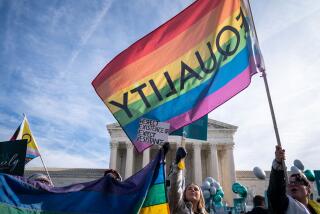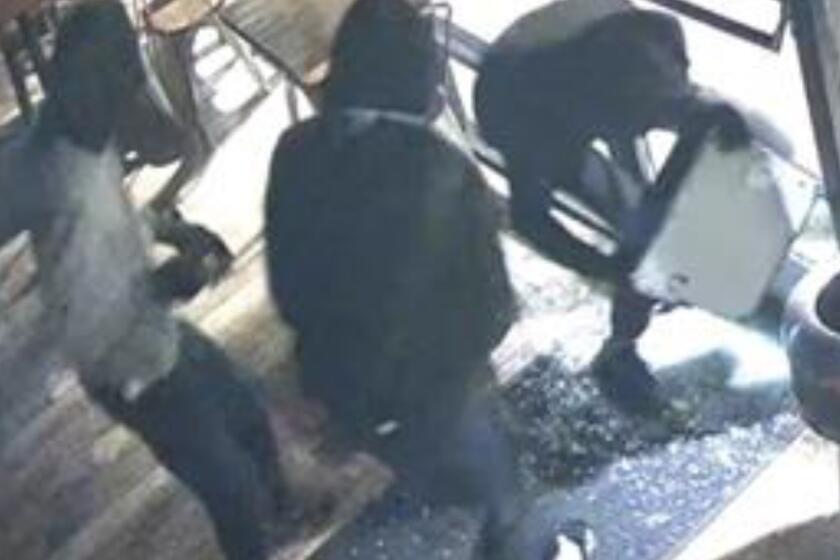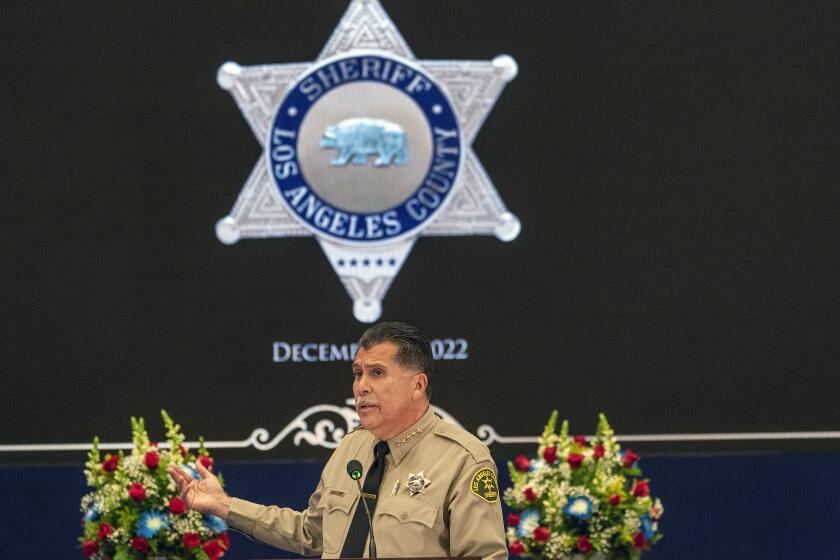California Supreme Court says breakaway parish can’t take national church’s property
Rebellious congregations that part ways with their denominations may lose their church buildings and property as a result, the California Supreme Court said Monday in a unanimous ruling.
The state high court decision came in a case involving the Episcopal Church, but lawyers said it would apply to other denominations as well.
Several Protestant denominations, including United Methodists and Presbyterians, have faced upheaval over gay rights issues. Monday’s ruling, along with similar victories that the church leadership has won in other states, is expected to dampen enthusiasm for such separations.
In a decision written by Justice Ming W. Chin, the court said the property of St. James Anglican Church in Newport Beach was owned by the national church, not the congregation. The congregation split away after the national church consecrated a gay man, V. Gene Robinson, as bishop of New Hampshire in 2003.
“When it disaffiliated from the general church, the local church did not have the right to take the church property with it,” Chin wrote for the court.
The ruling follows a decision last month by 700 conservative Episcopal congregations to form a separate church in North America. The move -- driven partly by four breakaway Episcopal dioceses, including one in the Central Valley -- probably will trigger new disputes over church property.
The bishop of the Episcopal Diocese of Los Angeles applauded the ruling even as he held out an olive branch to St. James and other parishes sued by his office
The Rt. Rev. J. Jon Bruno said the diocese was “overjoyed” and predicted that the ruling would encourage disgruntled congregations to remain united with their mother churches.
Although the ruling came in a lawsuit over St. James parish, Bruno said it also would affect property disputes involving St. David’s Church in North Hollywood and All Saints Anglican Church in Long Beach.
“We look forward to the possible reconciliation with these congregations,” Bruno said.
Because the ruling could affect other denominations as well, several churches joined the Episcopal hierarchy in arguing against the Newport Beach congregation. They included United Methodists, Presbyterians and Seventh-day Adventists.
“The other denominations who were with us were very pleased,” Bruno said.
But some breakaway parishes remained defiant.
The Rev. William Thompson of All Saints Anglican Church in Long Beach called the ruling “a disappointment,” and said that reconciling with the Los Angeles diocese was not an option for his parish of 350 to 400 members.
“Our congregation will survive and, I think, thrive, no matter what the outcome,” he said. “We are not anticipating somebody coming tomorrow and removing us. We don’t think that’s going to happen. Beyond that, I just don’t know.”
Eric Sohlgren, an Irvine attorney who represented All Saints and St. James, said the ruling might deter congregations from joining national denominations in the first place. He said the St. James parish would introduce new evidence in trial court to try to demonstrate that it should prevail, even under Monday’s ruling, and might appeal to the U.S. Supreme Court.
Asked if the loss of a church and its property might make parishioners reluctant to break from a denomination, Sohlgren said, “I think people of faith make decisions about which church to attend based on theology and doctrine of that church.” But he added, “It will certainly create an issue for them to think about.”
Heather Anderson, an attorney for the national Episcopal Church, said she strongly doubted that the U.S. Supreme Court would hear an appeal or that the local congregation could persuade a trial court that it should prevail. Once the case is finally resolved in the trial court or in negotiations, parishioners who wish to remain apart from the Episcopal Church will have to find another place to worship, she said.
St. James was one of about 100 Episcopal parishes that broke off relations with the national church after Robinson’s ordination. Disputes over the real estate landed in courts across the country, and most ruled for the church hierarchy.
St. James, located on Balboa Peninsula, overlooks grand yachts and boats floating on Lido Channel and is blocks from the Pacific Ocean. The congregation left the U.S. church in July 2004 and affiliated itself with the Anglican Church of Uganda.
The Los Angeles diocese and the national church sued the parish and several parishioners and claimed ownership of the church and its real estate.
The parish, founded in the 1940s, argued that it had title to the property and had purchased additional parcels in its own name over the years with funds donated by members. St. James contended that it would be unjust to strip the parish of property that it paid for and maintained simply because the parish changed its spiritual affiliation.
The state high court said it could resolve the St. James lawsuit by looking to property deeds, state law, the local church’s articles of incorporation and the national church’s canon and rules.
Although the deeds showed the local church owned the property, the parish had agreed to be part of the greater Episcopal Church of the United States and to be bound by that church’s rules, the court said.
The church added a section to a canon in 1979 that said parishes held property in trust for the greater church.
“The local church agreed and intended to be part of a larger entity and to be bound by the rules and governing documents of that greater entity,” Chin wrote.
Justice Joyce L. Kennard wrote separately to say that no secular institution would be permitted to take someone’s property that way.
“This result is constitutional, but only because the dispute involves religious bodies and then only because [legal doctrine,] permissible under the 1st Amendment, allows a state to give unbridled deference to the superior religious body or general church,” Kennard wrote.
The Episcopal Diocese of San Joaquin was among those that hoped to benefit from the court’s ruling.
The diocese sued its former bishop, John-David Schofield, after he and a majority of congregations in the diocese broke away in 2007, placing themselves under the authority of a conservative Anglican archbishop in South America. Schofield was ousted by the Episcopal Church and replaced by Bishop Jerry Lamb.
The diocese’s lawsuit seeks the return of more than 30 church properties.
The court’s decision “supports the contention that Bishop Lamb is in fact the bishop of the diocese and therefore he is the owner of the property,” said the Rev. Canon Mark Hall, assistant to Lamb.
Even though Monday’s ruling only affects California, the court is influential nationally.
The issue is playing out in several states, including Virginia, where a judge last month backed the property claims of 11 breakaway parishes. That ruling is under appeal.
The Rev. Ian T. Douglas, a professor of mission and world Christianity at Episcopal Divinity School in Cambridge, Mass., said the decision probably would have a chilling effect on parishes elsewhere in the country that have left the Episcopal Church in recent years amid doctrinal disputes.
“The fact that the highest level of court ruled in favor of the Episcopal Church sends a message that it’s going to be an uphill battle to try to withdraw properties from the church,” Douglas said.
“No one wins in these cases,” he added. “We’re so busy battling each other that we’re not doing God’s work, and that’s the tragedy.”
--
duke.helfand@latimes.com
--
Times staff writer My-Thuan Tran contributed to this report.
More to Read
Start your day right
Sign up for Essential California for news, features and recommendations from the L.A. Times and beyond in your inbox six days a week.
You may occasionally receive promotional content from the Los Angeles Times.







